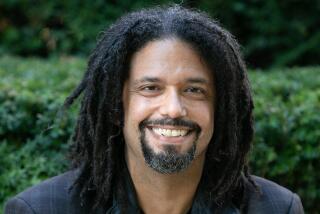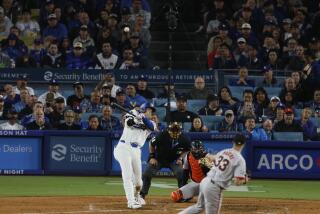Collection of Stubs Is Fullerton Man’s Ticket to Eventful Hobby
After watching Nolan Ryan throw a no-hitter at Anaheim Stadium, Michael G. Hess, thought to himself, “I better save the ticket stubs. You never know. They might be worth something.”
That was June 1, 1975.
From that first ticket, Hess has amassed a collection of 10,000 stubs from an assortment of events.
At first Hess hoped to make money by collecting and selling the stubs but decided that he would rather avoid the stresses of bartering, such as that experienced by baseball card traders.
He has never sold any of the stubs.
“Now I’m just fascinated in learning about the people who bought the ticket in the first place,” said the Fullerton resident. “When I take a look at the ticket stub I wonder about the guy who spent his last 10 bucks for it.”
In fact, adds Hess, “I’m hoping to locate some of the people who owned the stubs and meet and talk to them about the event they attended. That would be the real kick of it all.” Some of his ticket stubs include those from game three of the 1989 World Series in San Francisco on the day of the earthquake, the day Hank Aaron hit his 715th home run, a stub from a Bush vs. Dukakis debate and one for the filming of a Pepsi commercial at which pop idol Michael Jackson was burned in a freak accident.
The stubs, some catalogued in binders, but most stored in shoe boxes, are from concerts, plays, travel, transportation, tourism, political events, pageants, museums and amusement parks.
“Anything that requires a ticket,’ said Hess, who estimates that he has attended only a few hundred of the events for which he has ticket stubs. “Many of those are from UCLA games,” the Bruin fan said.
Hess has set up a network of helpers throughout the United States with whom he trades stubs, including correspondents in Texas, Indiana and San Francisco.
“You have to be very selective sending ticket stubs to people you have never met,” he said. “For a while I was sending some really good ones, but I wasn’t getting good ones back.”
The best have a history attached to them, such as a no-hitter in baseball, according to Hess. He sometimes advertises in newspapers for stubs for particular events.
Although he doesn’t keep a written record, Hess contends that he can track all his stubs in his mind.
“I may not be able to tell you what I had for dinner last week, but I can tell you each stub I have,” he said, adding that that includes what each stub looks like.
“Tickets made years ago were all special, but the tickets of today are all plain,” he said. “They all started to look like that when you started buying from the electronic booth like Ticketron.”
He has established a “stub of the week contest” at his workplace at Hunt-Wesson Foods in Fullerton, and at year’s end throws a banquet and gives awards for the best stubs contributed to his collection.
Hess considers himself a small-time collector. He said he is unaware of any organization of ticket-stub collectors.
“I’m sure there is a market out there for them,” said Hess, who does not know how much his collection is worth.
“When you try to make money from your hobby you lose the worth of it,” he said, pointing out that the fun is in the collecting, not the selling. “Guys that try to make money on it, ruin it.”
While he has stubs from many events, “I still don’t have one from a Beatles concert,” he said. “The collection will never be historically complete without one of them.”
More to Read
Go beyond the scoreboard
Get the latest on L.A.'s teams in the daily Sports Report newsletter.
You may occasionally receive promotional content from the Los Angeles Times.










